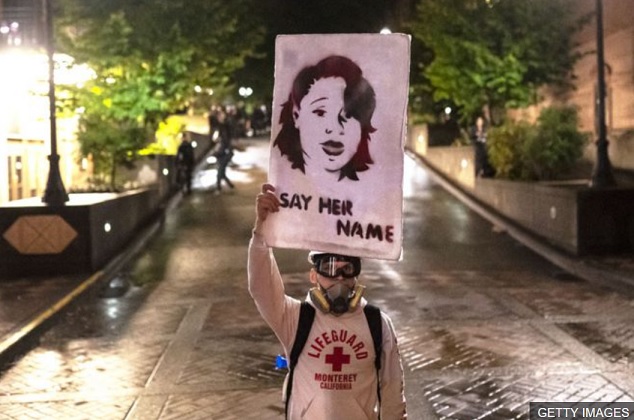
Three officers were involved in the police raid that ended with Breonna Taylor shot dead in her home in Kentucky. Only one of them has been charged, but not in relation to her death. Why are so few police officers charged after fatal shootings in the US?
Brett Hankison faces three counts of "wanton endangerment" for firing into an adjacent apartment, putting Ms Taylor's neighbours at risk.
The other two officers involved were not charged - despite one of them firing the fatal shot - because Ms Taylor's boyfriend fired first, mistaking them for intruders.
It's a decision that has sparked some bewilderment and prompted hundreds to take to the streets of Louisville and elsewhere. But it's not the first time a fatal shooting by a police officer has made headlines but not made it to trial. The ones that do are a tiny fraction.
In 2020 so far there have been 10 officers charged, according to Dr Phil Stinson, a professor at Bowling Green State University in Ohio and a former police officer, who has been collecting data on police prosecutions since 2005.
The year with the most officers charged was 2015, when 18 law enforcement members faced murder or manslaughter charges.
The Washington Post estimates police shoot and kill about 1,000 people each year in the US. Most of those incidents do not rise to the level of controversy or scrutiny seen in Ms Taylor's case, and may have occurred when the officers were themselves fired upon.
But getting a charge or conviction for those tragedies that involve excessive use of police force is rare.
These are the factors that explain why.
The law over reasonable force
Although the language of laws that dictate what police may do vary from state to state, the most common standard officers have to abide by is that their use of force be "objectively reasonable".
That means the officer had a reasonable belief in the moment that he or she, or a bystander, were about to be harmed.
That standard has come under increased scrutiny for giving police too much leeway, particularly the flexibility of the word "reasonable" - it could be enough that an officer believed they were in danger at the time, even if hindsight showed they were not.
"In these cases, historically, the police have owned the narratives. Bystander accounts are discounted, oftentimes," says Dr Stinson."Written reports are sometimes factually inconsistent with the video evidence."
California changed its use of force law in August, swapping out the word "reasonable" for the word "necessary". It's probably one of the strictest laws in the country.
Local prosecutors also have nearly unlimited discretion on whether or not to bring charges against officers, and won't if they deem the shooting justified.
Some jurisdictions use a grand jury to make the determination on whether to charge, but these proceedings are secret.
Prosecutors work closely with police in their day-to-day caseload, which Kate Levine, an associate professor at the Benjamin N Cardozo School of Law, says could lead to more favourable treatment.
It could also be easier not to bring charges, she adds, if there are doubts they can prove a case.
"You want to think about it more cynically, it's very easy to say you can't prove a case when you don't want to."
Trust in police
Judges and juries may also have trusting feelings towards police, and be less likely to doubt their word, says Ms Levine.
"Part of their job is, in theory, putting themselves in dangerous situations with people who can cause harm to them or others.
"Social norms dictate that people tend to believe the police when they say they were in fear for their life. So it's hard to make a case that they weren't without evidence to the contrary."
The unions
Police unions are some of the strongest in the country, and over time some have written into officers' contracts various conditions that can slow the investigative process after a killing, such as giving the officer advance warning about an impending investigation.
The former police chief of Philadelphia, Charles Ramsey, openly complained that he could not fire officers who'd committed crimes because of the city's union-negotiated arbitration system.
Officers also benefit from qualified immunity, which means they can't be personally or monetarily held responsible in civil lawsuits. The thinking goes that with these kinds of protections, officers have little to fear of consequences for their actions.
But Stinson cautions that police unions give the majority of officers important rights.
"The collective bargaining agreements provide due process protections more than anything else," he says. "And police officers don't shed their constitutional rights when they walk into a police station each morning."
Systemic changes
Some have cautioned that putting all the focus on charges and prison time for police officers who kill civilians gives a false sense that policing in the US is truly changing.
Ms Levine says looking at the procedures used by the officers in Ms Taylor's case is more important to lasting reform.
"We are really spending too much time focusing on prosecution and incarceration of individual police officers," she says, "and not enough time on big systemic changes that will stop police officers from being at Breonna Taylor's house in the early hours of the morning with a battering ram.".

